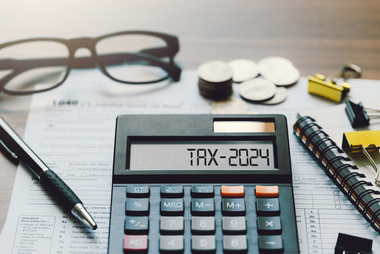Get Ready To File in 2024

The beginning of the new year is the time for taxpayers to start gathering their documents for filing their 2023 returns. And the IRS has announced some important enhancements taxpayers should be aware of to ease the yearly burden.
It’s hoped taxpayers will find that the enhancements made by the IRS to the online filing process will ease the filing experience. By accessing their online accounts, taxpayers can view, approve and electronically sign power of attorney and tax information authorizations for their tax professional. Taxpayers can also perform any of the following tasks when logging into their accounts:
- View their tax owed and payment history, and schedule payments.
- Request tax transcripts.
- View or apply for payment plans.
- See digital copies of some IRS notices.
- View key data from their most recently filed tax return, including adjusted gross income.
- Validate bank accounts and save information of multiple accounts, eliminating the need to reenter bank account information every time they make a payment.
Once the tax return has been submitted, the IRS issues most refunds within 21 days. This is not a hard-and-fast rule, and taxpayers should be prepared for delays in receiving their refunds. This is especially true if the IRS suspects fraud or identity theft, if the return has missing information, or there is a possible error. Some people claiming the earned income tax credit or the additional child tax credit should not expect to see their refunds before mid-February. The reason is that the IRS cannot legally issue only a portion of the refund; the entire refund must be held until February 27.
Everything in its place
As with all important documents, taxpayers should develop a system for organizing their electronic or paper records in one convenient place. This includes year-end income documents like Forms W-2 from employers, Forms 1099 from banks or other payers, Forms 1099-K from third-party payment networks, Forms 1099-NEC for nonemployeecompensation, Forms 1099-MISC for miscellaneous income or Forms 1099-INT for interest paid as well as records documenting all digital asset transactions. This increases the likelihood that returns will be processed easily and refunds will not be delayed.
The IRS delayed the new $600 Form 1099-K reporting threshold for third-party settlement organizations for calendar year 2023. This year will be treated as a transition year to reduce any confusion caused by Forms 1099-K being sent to taxpayers who wouldn’t expect one and may not have a tax obligation. As a result, reporting will not be required unless the taxpayer receives more than $20,000 and has more than 200 transactions in 2023. Taxpayers should understand why they receive Form 1099-K and how to use it to report their correct income on their tax form. If they should not have received the form in the first place, taxpayers need to know what to do to correct the mistake.
Those purchasing a vehicle in 2023 will want to review the changes under the Inflation Reduction Act of 2023. If you purchased an eligible electric vehicle in 2022 or before, or bought a new clean-energy vehicle in 2023, you may qualify for the credit. To claim either credit, submit the vehicle’s vehicle identification number and file Form 8936, Qualified Plug-in Electric Drive Motor Vehicle, with your tax return.
Tax credits may also be available if you qualify for expenses related to energy improvements in your home. To claim the credit, taxpayers need to file Form 5695, Residential Energy Credits, Part II, with their tax return.
Finally, the fastest way for taxpayers to receive their refunds is to file electronically and to opt for direct deposits to their bank accounts. Prepaid debit cards are another option to allow taxpayers to directly deposit their tax refunds. Contact a tax professional for additional guidance on filing your tax return accurately and to make sure you receive the credits and refund you earned.
Indeed, this is just a summary, and there are other federal rules as well as state and local rules that affect your tax situation. All the more reason to work with a qualified tax professional.